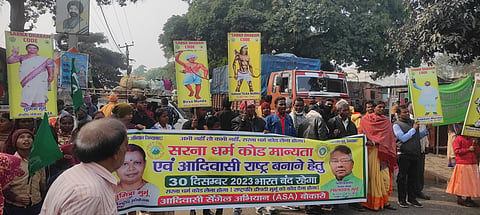
Ranchi- In a comprehensive letter addressed to President Draupadi Murmu, former Member of Parliament and National Head of Adivasi Senegal Abhiyan (ASA) Salkhan Murmu has vehemently called for the immediate announcement of a separate Sarna Dharma Code for India's tribal community. Murmu emphasized the urgency for tangible affirmative response from the Union government before March 31, warning of an imminent indefinite Bharat Bandh and Rail-Road Chakka Jam scheduled for April 7 if the stipulated demands remain unaddressed.
Over the past three years, Adivasi Senegal Abhiyan (ASA) has orchestrated a series of protests, significantly disrupting rail and road communication in five states. It has organized a total of five Bharat Bandhs since 2020, occurring on December 6, 2020; January 31, 2021; February 11, 2023; June 15, 2023; and December 30, 2023.
The Sarna Dharma Code, according to Murmu, holds the lifeline for approximately 15 crore nature-worshipping tribals in the country, serving as a crucial element for their existence, identity, and active participation in society.
Murmu accuses both the Congress and BJP of violating the religious freedom of tribals, alleging that the provision allowing for the recognition of Sarna Dharma Code existed until the 1951 census but was later removed by Congress. Furthermore, he contends that the BJP is making efforts to forcibly convert tribals into Hindus. The former MP argues that the 2011 census data, where 50 lakh tribals identified as Sarna, surpassing the 44 lakh Jains, underscores the urgency of protecting tribal fundamental rights, deeming the denial of religious freedom to tribals a constitutional crime.
Expressing dissatisfaction with the lack of progress, Adivasi Senegal Abhiyan, in collaboration with other tribal organizations, organized a symbolic Bharat Bandh and Rail-Road Chakka Jam on December 30. The impact of the protest was reportedly significant across multiple states. In response to the protests, Union Minister Arjun Munda suggested dialogue on an appropriate platform for the recognition of the Sarna Dharma Code, as reported by Amar Ujala.
Speaking to the Mooknayak, Salkhan Murmu said that the National Commission for Scheduled Tribes in Delhi has recommended providing a Sarna religion code to nature-worshipping tribals, a development perceived positively by the tribal society. However, Murmu insists on concrete positive announcements by concerned parties before March 31, threatening an indefinite Bharat Bandh and Rail-Road Chakka Jam on April 7, if the demands are not met.
The former MP calls upon all political parties and religious leaders, including Hindu, Muslim, Sikh, Christian, Jain, and Buddhist, to cooperate with the Adivasi Senegal Campaign in the pursuit of protecting humanity, nature, and the environment. The urgency for President Draupadi Murmu to grant the Sarna Dharma Code as per the Constitution is emphasized.
In addition to the demand for religious freedom, Murmu and the Adivasi Senegal Campaign express determination to safeguard Sarna religious places like Marang Buru, Lugu Buru, and Ayodhya Buru. They highlight their commitment to the cause through organized events, including the Marang Buru Bachao Sengel Yatra-Sabha and Haasa-Bhasha Vijay Diwas.
Murmu emphasizes that the Sarna Dharma Code movement is not just about religious freedom but also serves as a broader movement for greater tribal unity and the creation of a tribal nation within India, highlighting the larger goal of preserving tribal heritage, language, caste, religion, and employment.
The Sarna religion is embraced by its followers as a distinct religious group, primarily composed of nature worshippers. The core principles of the Sarna faith revolve around "Jal (water), Jungle (forest), Zameen (land)," with adherents offering prayers to trees and hills while emphasizing the preservation of forested areas. Unlike traditional practices, Sarna believers do not engage in idol worship and do not adhere to concepts such as the Varna system or notions of heaven and hell. The majority of Sarna followers are concentrated in tribal belt states like Odisha, Jharkhand, Bihar, West Bengal, and Assam.
Experts argue that with the global focus on addressing pollution and conserving forests, native communities should be placed at the forefront. Recognizing Sarnaism as a religious code becomes all the more crucial as the essence of this religion lies in the protection of nature and the environment.
Also Read-
You can also join our WhatsApp group to get premium and selected news of The Mooknayak on WhatsApp. Click here to join the WhatsApp group.